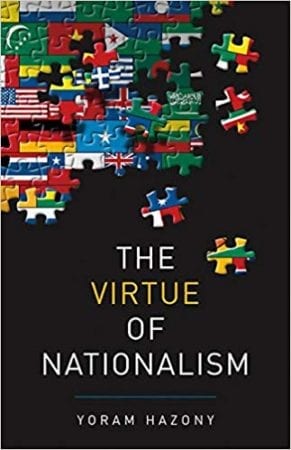I just loved this book, The Virtue of Nationalism, and one of the reasons I loved it is that Yoram Hazony, the author, is a structural thinker. When books appeal to data or statistics, you always have to factor in the possibility that the data has been scrubbed for you, or somehow cooked, or marinated in something unsavory. That graph on page 93 might be lies, all lies, in other words.

But if someone writes a book that shows us that it is either raining or it is not raining, but not both, the reader is on solid ground. Now of course if it is something like rain/not rain, such a book would have few readers because who needs to buy a $15.00 tautology? However, suppose that someone writes a book—as Hazony has done here—in which he outlines the basic alternatives for us, and does so in an area that has been much traversed, but not in this way, what happens is that the lights come on.
The golden takeaway from this book is that when someone tells us we need to rejection “nationalism,” Hazony asks what the alternatives are. He asks the salient question, compared to what? And the basic alternatives that lie on either side of nationalism question are, respectively, tribalism or globalism.
Once we have rejected nationalism, we don’t get to go off to the neutral room of geopolitics to help ourselves to the snacks there. There is no neutral room. If it isn’t nationalism, then it has to be something else. The two other things it can be is sub-national (tribal) or super-national (globalist).
Now of course, if you choose to opt for the nationalism route, then there are a multitude of ways to turn that into a toxic mess. And this is where the conversation veers if you let anyone know that you are partial to nationalism yourself. You Nazi.
But right now our only real options are between diseased nationalism and healthy nationalism. Reverting to tribalism is not really practical, despite the best efforts of our identity politics, and of course the soul of every true Christian revolts at the prospect of any kind of powder blue globalism. So if the idea of healthy nationalism—not jingoistic, not chauvinistic, not bellicose, but healthy—intrigues you, then you really need to get this book and savor.
Hazony is honest, open, intelligent, and it shows throughout the book. Get it.

